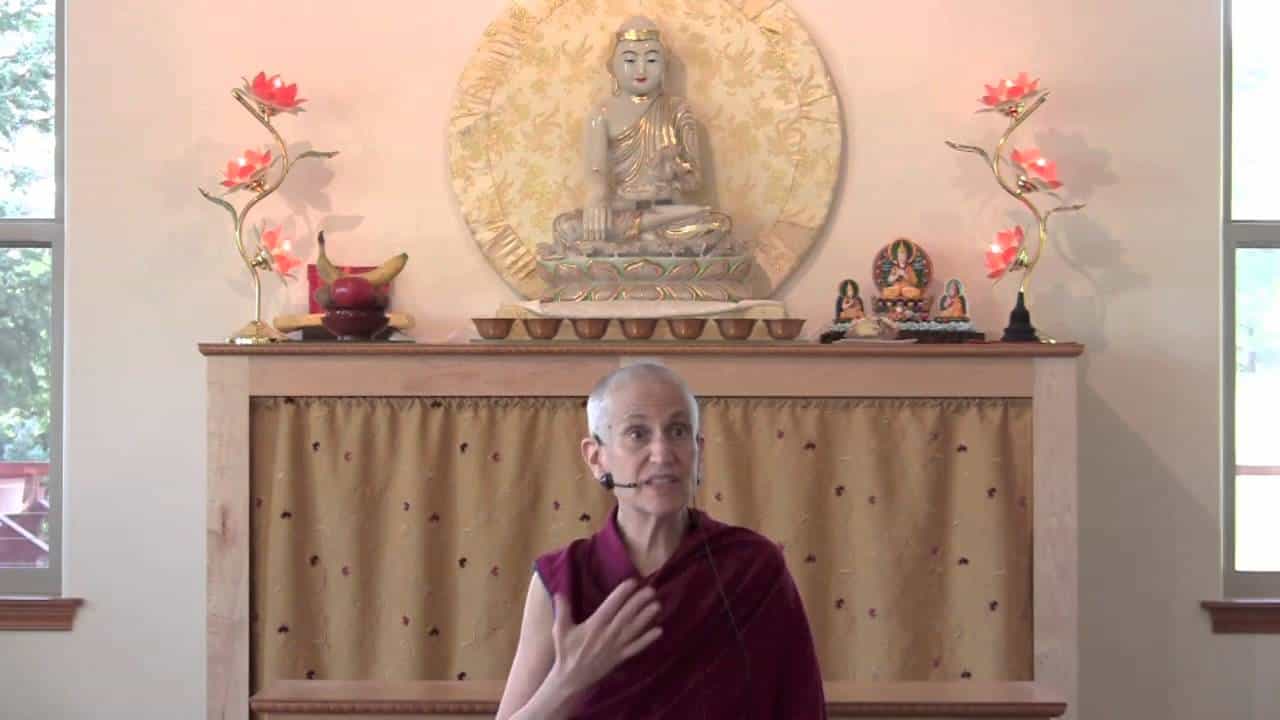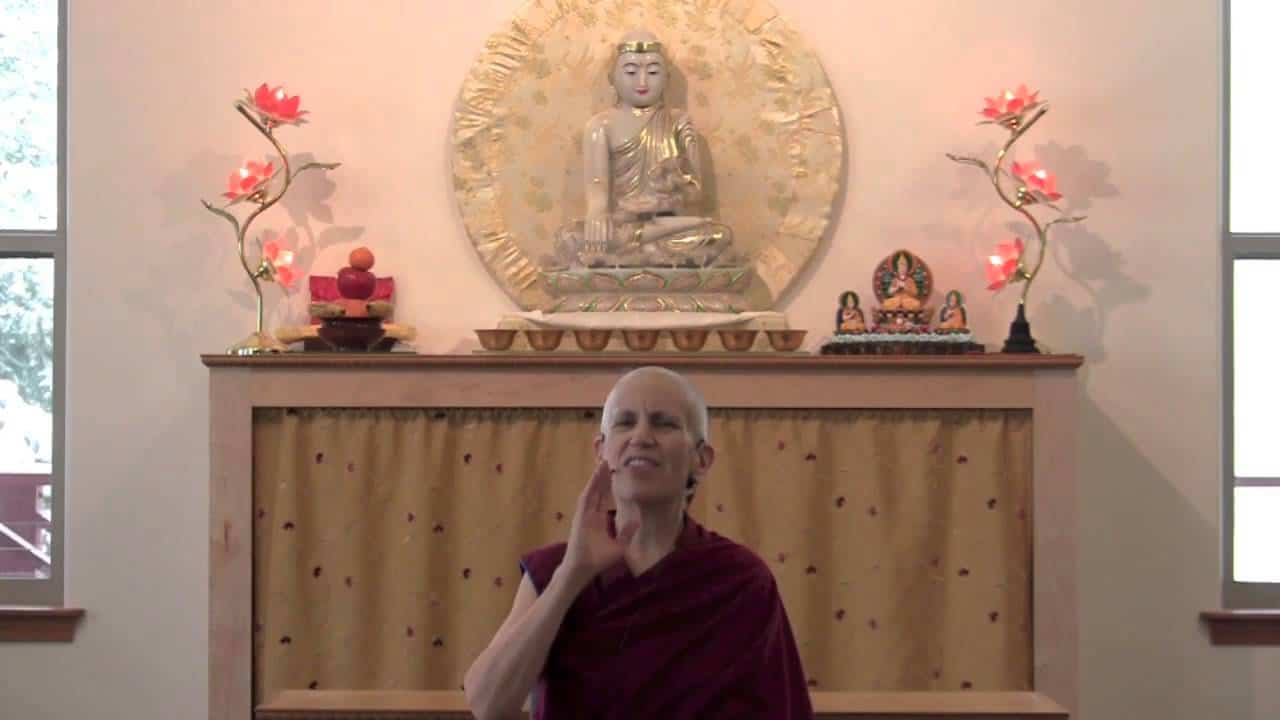Putting the Dharma into practice
Part of a series of teachings on the text The Essence of a Human Life: Words of Advice for Lay Practitioners by Je Rinpoche (Lama Tsongkhapa).
- Review of topics previously covered
- Putting whatever Dharma we have learned into practice
- Using our precious human lives wisely as life passes so quickly
- Putting ourselves in good environments to practice
The Essence of a Human Life: Putting the Dharma into practice (download)
Je Tsongkhapa continues,
This short life is over, gone in a flash.
Realize that, come what may, now is the time
to find happiness everlasting.
Do not leave this precious human life empty-handed.
He’s coming back once again, in his conclusion, to some of the topics that he discussed at the beginning. Remember at the beginning he talked about precious human life, he talked about death, and now he’s coming back to those same things again, reminding us we have a precious human life, so don’t waste it. You can do really wonderful things with it.
Although he didn’t go into the whole path here, he stayed mostly (in this text) on the path that’s in common with the initial level practitioner—somebody who is generating the motivation to have a good rebirth by meditating on death and impermanence, the possibility of a lower rebirth, then generating that motivation. Then to fulfill that motivation, taking refuge in the Three Jewels and learning about karma—to avoid negativity, to create virtue, to purify.
He isn’t going into the four noble truths so much in terms of motivating somebody to get out of samsara, or all the bodhicitta meditations to motivate somebody to want to attain full awakening, because he’s talking to a specific audience here. But if you’ve heard those teachings, you should also be bringing them into your mind here when Je Rinpoche is saying:
This short life is over, gone in a flash.
Realize that, come what may, now is the time
to find happiness everlasting.
Do not leave this precious human life empty-handed.
Whatever Dharma we have learned, the idea is to put it into practice, to make it so that it changes our life, to remember that we have an amazing opportunity right now. It’s not going to last forever. We don’t know when it’s going to stop. Even if we live a long time, at the end of our life it’s going to seem like it went by very quickly.
As you age, does it seem like time goes quicker? It does to me. It’s like, wow, it’s a whole year from last year. It seems like it was just a few months ago. Similarly at the time of death, we just look back, the life was there, gone, and what we take with us is our karma and our mental habits. To really put our energy into building that up now while we have the opportunity.
They often use the analogy in the texts of going on the sea journey to find the wish-fulfilling jewel. You find it, but then you return empty-handed because you threw it back in the sea or did something stupid. We have this beautiful life, let’s not go on to the next life without anything to take with us.
I think that’s really important. I don’t know about you, but I’ve always had the feeling that I don’t want to leave this life with regret. I sensed in my dad that he had some regret in his life. I didn’t find out until a few years ago what it was, but it conditioned me from the time I was a child. I don’t want to die with regret. If I make a mistake, I want to fix it up, but I also want to try and make good decisions. Especially after meeting the Dharma. To really make good decisions and put myself in a good environment where I can continue to learn and practice. If I put myself in a bad environment for Dharma practice, but a good one for sense pleasure happiness, then I’m going to wind up at the end of my life with the whole…. We have to learn the name of that thing where you put in all your pictures and it just shows all the pictures of your life again and again. Somebody gave my dad one of those and put all the family pictures in, and every five seconds it changes to another picture. That’s what you wind up with at the end of your life is just one of those digital picture books of your life, and when we’re dead, who wants that? It’s of no interest to anybody else.
Let’s really make our lives worthwhile for sentient beings, especially generating bodhicitta, especially putting seeds of the understanding of emptiness in our minds right now. Then when we die we won’t have any regret because we will have used our lives in a beneficial way as best as we could.
We shouldn’t pressure ourselves in the sense, “Well, if I only had more compassion I would meditate DAY and NIGHT….” That kind of putting pressure on ourselves doesn’t help us to use our lives wisely. It’s just a lot of shoulds and pressure. What this is saying here is look, contemplate, observe. Think about your life. Then make good decisions. Don’t make decisions based on attachment. Don’t make decisions based on anger, or on greed. Really think about, set your priorities in life very clearly, and make your decisions based on your priorities. And what other people say, they can say whatever they want. And actually if people tell you you’re crazy because you’re practicing Dharma, it probably means that you’re doing something good. Because if your family and your old friends are saying, “What are you doing? You’re wasting your life. Come with me, we’re going to the Bahamas over Christmas…. What are you doing that stupid thing for with those people? It’s a cult, don’t you know?” If your friends are saying that and telling you you’re spending too much time with “those people,” then you’re probably doing some good Dharma practice and putting yourself in a good environment. Because worldly people are never going to understand, so stop expecting them to. Just let them be. And then they’ll see, as you change and you become a happier person and a kinder person, then they see automatically the value of the Dharma. So don’t worry about what other people tell you to do. Unless it’s somebody who’s wise. They always say listen to the advice of the wise.
Venerable Thubten Chodron
Venerable Chodron emphasizes the practical application of Buddha’s teachings in our daily lives and is especially skilled at explaining them in ways easily understood and practiced by Westerners. She is well known for her warm, humorous, and lucid teachings. She was ordained as a Buddhist nun in 1977 by Kyabje Ling Rinpoche in Dharamsala, India, and in 1986 she received bhikshuni (full) ordination in Taiwan. Read her full bio.


